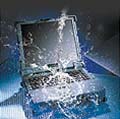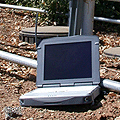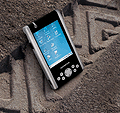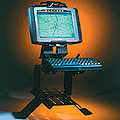|
Advantech AIMB-780
High-performance Intel Core i3/i5/i7 ATX motherboard for complex industrial applications
(by Conrad H. Blickenstorfer)
Full size ATX motherboards are not what we generally examine in our lab here at RuggedPCReview where we usually deal with computers that can be carried around on the job or stowed away in a pocket. However, big boards like these are very much part of the overall rugged and industrial computing landscape. They are used whenever a job requires all the ports and interfaces and expansion potential of a full desktop machine, and whenever utmost reliability matters. Boards like the AIMB-780 from Advantech look like your standard motherboard in a standard desktop but, in fact, they are several lightyears north of the electronic store bargain basement specials many of us bought for our build-your-own-PC projects.
While most mobile systems have custom motherboards designed specifically for a certain model and form factor, stationary systems, even if they are used in the field, are more likely to be built around standard components with standard dimensions and standard interface technologies. Selecting the right motherboard can become an important issue, and it involves the following variables:
- Size and dimensions
- CPU socket, processor support and chipset technology
- Power and power connectors
- Interface requirements
- Standards support
Those familiar with embedded systems know that there are about two dozen different computer board form factors. Some of them are full motherboards, but sometimes, system integrators prefer to use Computer On Module (COM) technology where the generic computing "engine" resides on a separate board that is then plugged into a "carrier" board designed for some specific purpose. This way, system integrators can select the right COM for a complex embedded systems project and then concentrate on their application rather than having to design an entire computer from scratch, saving as much as 80% of the regular development time and cost.
Other times the task at hand can best be filled by a full-featured standard motherboard, but there are detailed requirements and space is an issue. In that case, you'd be looking for a board with just the right functionality that also fits into the allotted space. For example, let's assume an application requires substantial computing power, including server-class processors, and fast memory, support of multiple displays, multiple high-speed disks, dual high speed Ethernet ports, as many USB ports as possible, and also extensive RS232 legacy support. The system should also offer a good number of PCI slots for full-size cards, as well as flexible PCI Express support for one, four and 16 lane cards. Space and power requirement aren't much of an issue, but add-on graphics and multiple network connections are. Enter...
The Advantech AIMB-780 ATX board
ATX, which stands for "Advanced Technology Extended" and was introduced in 1995 by Intel, is an industry workhorse. An ATX board measures 12 x 9.6 inches and can be mounted in all full-size tower and similar enclosures. Unlike on notebook boards where ports can be almost anywhere, ATX ports are all concentrated in a rectangular block, though what connectors go on the back is up to the manufacturer. And since there is limited space for external connectors, ATX boards can also contain a good deal of additional connectivity on the board itself. That can be accessed, if needed, by included or optional cable kits so that ports can be mounted in unused expansion card cutouts.
Below you can see what the bare Advantech AIMB-780 ATX motherboard looks like, both from above and looking at the external I/O block:

What is special about the AIMB-780 is that it's designed to pack a punch. It supports the following recent and powerful Intel processors:
- Xeon 3470 (4 cores, 8 threads, 2.93/3.6GHz, 8MB smart cache, ECC, 95 watts)
- Core i7 870 (4 cores, 8 threads, 2.93/3.6GHz, 8MB smart cache, 95 watts)
- Core i5 750 (4 cores, 4 threads, 2.66/3.2GHz, 8MB smart cache, 95 watts)
- Core i5 660 (2 cores, 4 threads, 3.33/3.6GHz, 4MB smart cache, embedded graphics, 73 watts)
- Core i3 540 (2 cores, 4 threads, 3.06GHz, 4MB smart cache, embedded graphics, 73 watts)
- Pentium G6950 (2 cores, 2 threads, 2.8GHz, 3MB smart cache, embedded graphics, 73 watts)
Of these, the Xeon is a heavy-duty server chip, and the various Core processors offer high performance and a variety of special Intel technologies (the i7 most, the i3 least), while the Pentium (yes, Intel is still introducing new Pentiums) represents a significantly lower cost solution. Depending on the chip, the board will come with either the Q57 or the 3450 chipset. If error-correcting ECC memory is an issue, systems with the 3450 chipset support it.
Superior graphics performance may or may not be an issue for systems using the AIMB-780 board. For server-oriented applications, graphics usually don't matter much, but other applications may require either the fairly powerful Intel HD graphics integrated into some of the available CPUs, or include an add-on high-performance graphics card via the board's PCIe x16 expansion slot. Up to a gigabyte of main system memory can be shared for graphics, and dual displays are supported via standard rear I/O VGA and DVI ports.
The board offers dual 10/100/1000Base-T gigabit Ethernet, and there are two RJ45 jacks on the rear I/O panel. LAN1 uses an Intel 82578DM controller, LAN2 an Intel 82583V controllers. There are slight technical differences between the two, with a potentially interesting one in the 82578DM's Intel vPro support (remote control applications).
For disks and other drives, the board offers no fewer than six 300 MB/s SATA channels, with software for RAID 0, 1, 10 and 5. Unlike many of the smaller form factor Advantech boards, the 780 doesn't have a CF Card slot.
The rear I/O panel has four USB 2.0 ports, two legacy PS/2 ports for keyboard and mouse, and two RS232 serial ports. What you see on the rear I/O panel, however, is only part of what the AIM-780 offers. On the board itself are ten(!) more USB 2.0 connectors, two additional RS232 serial connectors (one supporting RS232/422/485), floppy disk, parallel, as well as digital audio (in addition to the rear panel microphone, speaker/headphone jacks.
While most of the functionality is pretty much ATX standard, the AIMB-780 offers industrial features such as long product life, reliable operation under a wide temperature range, watchdog timer, CMOS backup functions (backup into battery-independent flash ROM), and supports a good number of Advantech's very useful embedded software APIs and utilities. ActiveManagement Technology 6.0 offers a variety of remote management capabilities to discover and/or repair the system after an OS failure or when the system is powered down.
As is usually the case on a motherboard, there is a good number of jumpers. COM3 can be configured for RS232, RS422, or RS485. The single power connector can be either in AT mode or in ATX mode. There is a jumper to clear CMOS and ME data, and one for watchdog reset.
Anyone who has ever built their own PC from parts knows about the system panel connector that interacts with buttons and lights on the case or enclosure. It connects to the system power LED, reset button, power button, and hard disk activity light. That's no different on an industrial ATX board.
The BIOS offers the usual wealth of setup options, both the common sense stuff and the and arcane settings that sometimes make all the difference between an optimized system and one that tends to act up. And here is a diagram of how it all fits together:

What's in the box
Here is what Advantech ships when you buy the AIMB-780 for your project:
- AIMB-780 ATX Main board
- Driver DVD
- Startup manual
- two SATA HDD cables
- two SATA power cables
- COM port cable kit
- I/O port bracket
Drivers generally support from Windows 98 on up, including Windows 7 32 and 64-bit. As far as pricing goes, at the time of our analysis, the bare board runs US$323. CPU, fan, memory, disk are extra.
Overall, while we did not get a chance to run the board, it sure looked impressive. Everything is neat and clean and well organized. Soldering is clean and perfect, nothing is loose, and there wasn't a single jumper wire "fix." Add to that the variety of supported processors with two different chipsets and different memory support, and the AIMB-780 represents a very solid and highly configurable foundation for many industrial computing projects.
-- Conrad H. Blickenstorfer
Advantech AIMB-780 specs:
| Type |
Industrial-grade ATX Motherboard
|
| CPU Type |
Intel Core i3/i5/i7, Xeon 34xx, Pentium G69xx
|
| Chipset |
Q57 for QG2 version; 3450 for WG2 version (WG2 only supports Xeon 34xx, Core i5 6xx, Core i3 5xx, and Pentium G69XX CPUs)
|
| BIOS |
AMI 64 Mbit SPI
|
| Memory |
Max 16GB Dual Channel DDR3 1066/1333 in 4 240-pin DIMM sockets |
| Graphics Controller |
Intel HD Graphics (Core i5-6xx, Core i3 and dual core Pentium CPUs have integrated graphics) |
| VRAM |
1 GB maximum shared memory with 2 GB and above system memory installed |
| DVI |
Yes, 1 (up to 1920 x 1200 pixel)
|
| VGA |
Yes, 1 (up to 2048 x 1536 pixel) |
| Dual display |
Yes
|
| LAN |
Yes, 2 (LAN1: Intel 82578DM, LAN2: Intel 82583V) |
| SATA |
Yes, 6 (300 MB/s) |
| EIDE |
NA
|
| SSD |
NA
|
| Expansion: PCI |
Yes, 4 (32-bit/33MHz)
|
| Expansion: PCIe x1 |
Yes, 1 (250 MB/s per direction)
|
| Expansion: PCIe x4 |
Yes, 1 (1.0 GB/s per direction)
|
| Expansion: PCIe x16 (Gen2) |
Yes, 1 (8 GB/s per direction)
|
| USB |
14 x USB 2.0 (4 rear panel, 10 on board) |
| Serial |
4 x RS232 (2 rear panel; 1 x RS-232, 1 x RS-232/422/485 with auto flow control on board) |
| Parallel |
Yes, 1 (board) |
| PS/2 |
Yes, 2 (1 keyboard, 1 mouse) |
| FDD |
Yes, 1 (board) |
| Audio |
Yes, 2 (Mic-in, Line-out) |
| DIO |
NA |
| Watchdog Timer |
Yes, 1 (System reset, Programmable 1 ~ 255 sec/min) |
| Size |
305 mm x 244 mm (12" x 9.6")
|
| Operating Temp. |
32 to 140 degrees Fahrenheit (depends on CPU, speed and cooler solution) |
| Price |
Starting at US323 (w/o CPU/td>
|
| Datasheet |
Advantech AIMB-780 |
| Manual |
AIMB-780 manual (PDF) |
| Advantech store |
Advantech AIMB-780 |
Advantech Corporation
38 Tesla, Suite 100
Irvine, CA 92618
Toll Free: 1-800-866-6008
Ph: 949-789-7178
Fax: 949-789-7179
ECGInfo@advantech.com
www.advantech.com
Advantech Co. Ltd.
No.1, Alley 20, Lane 26, Rueiguang Road
Neihu District, Taipei Taiwan 114, R.O.C.
Tel: 886-2-2792-7818
Fax: 886-2-2794-7301
www.advantech.com
|













